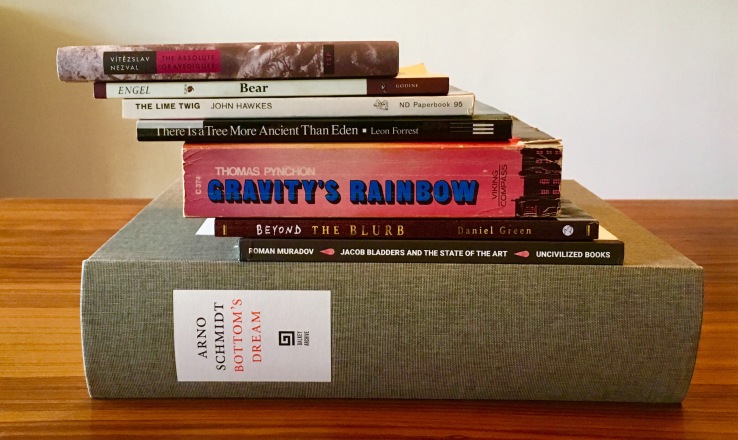
I don’t know.
I feel like I’ve got nothing in me.
It’s easier to work from what’s outside of me lately, so I’ve been doing these Gravity’s Rainbow annotations; I “finished” (not the right verb) a third reading this weekend and then dipped back into it again—this time in the middle. I was thinking of doing a “how to read Gravity’s Rainbow” post but that seems fucking pretentious. I love the book though.
This stack looks big, but it’s not really—most of the other books there are slim volumes I worked into my reread of Gravity’s Rainbow. Little breaks, of a sort.
But not that big book at the bottom.
That big book at the bottom, Bottom’s Dream? Hm. Not sure about this guy. It’s too big to read. I mean physically. It’s unwieldy, uncomfortable, uncurlupwithable. I can’t get a rhythm going there.
Roman Muradov’s Jacob Bladders and the State of the Art will get a full review soon; the book starts with the best opening line of read in a contemporary story in years: “READER YOU HAVE NO WORTH.”
Daniel Green’s Beyond the Blurb will also get a review, sort of, soon (the book is a critical survey of literary criticism, making a review of it especially difficult to me). I have n interview with Green in the works.
Not pictured here because it’s an e-book is Scott Esposito’s The Missing Books. Esposito’s book is a continuing project, a “curated directory of books that do not exist, but should.” I read it in one sitting and was frankly jealous that I hadn’t written it.
Leon Forrest’s There Is a Tree More Ancient Than Eden is a novel I read in a blur, a kind of fever dream postmodern pastiche, a narrative unstuck in time and yet wholly about a specific time and place and past and consciousness. I need to read it again; like so many so-called “experimental” novels, a first reading is highly impressionistic but also confusing. Forrest throws you in the deep end. The prose is liquid, viscous, and you’re swimming around for edges, contours to grab onto. Just a marvelous strange read, and it deserves better than I’m giving it here—I mean, I think the novel deserves way more attention, and I’ll attend to it again.
Vítězslav Nezval’s 1937 poetry collection The Absolute Gravedigger is new in English translation by Stephan Delbos and Tereza Novická (Twisted Spoon Press). I hadn’t read Nezval before now, but I did see Jaromil Jireš’s film adaptation of his novel Valerie and Her Week of Wonders; if you know it, you’ll perhaps have an idea of some of Gravedigger’s rich dark weird flavor. There’s something of Bosch or Goya in the spare poems—somehow simultaneously bleak but vivid, morose but witty. The cityscapes, the entropy, the impressionistic details here all melded into my Pynchon-addled brain with the immediate post-War Zone of Gravity’s Rainbow: broken bits of civilization twitching into new combinations of reality.
Marian Engel’s Bear is this wonderfully lucid story of a bibliographer who goes to a remote island to document the contents (and library) of an old semi-famous house. Engel’s sentences are too good; there’s something fresh and restorative about the prose that echoes the plot, which is both simple and bizarre. Also, the bibliographer has a sexual relationship with a bear.
I read the first half of John Hawkes’s The Lime Twig over two short plane rides. I might have finished it, but I had to read every paragraph twice. I haven’t picked it up since the election on Tuesday. Maybe this post will motivate me to pick it up. Here’s Flannery O’Connor’s so very accurate blurb from the back cover:
You suffer The Lime Twig like a dream. It seems to be something that is happening to you, that you want to escape from but can’t. The reader even has that slight feeling of suffocation that you have when you can’t wake up and some evil is being worked on you.
Evil is being worked on you.

i love whatever you write about gravity’s rainbow. write more about it!
LikeLike
The interlacing of the text itself should keep you plenty busy without being overly concerned by annotating the text. Rilke, the Grimms, Herrero history in “German” W Africa, the already globalized industrial world of Farben, GE make a start. I loved that book from the moment I started it in Victorian London.
LikeLike
Interesting collection. Bear is a bit of a Canadian classic. I have it, but have never read it — must remedy that. The Absolute Gravedigger is definitely an intriguing work. The title poem in particular takes some digesting. Bosch, is quite an apt reference for the more surreal pieces. I like to take poetry books slowly — this one seems to demand it.
LikeLike
I burned through Gravedigger—just read it for the images/language. I probably didn’t really “get it” at all.
LikeLike
I am currently trying to read gravity’s rainbow myself. My first Pynchon, not an easy book, I admit. Every post about it is highly appreciated.
LikeLike